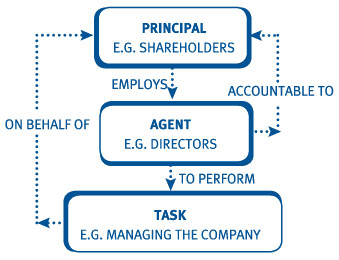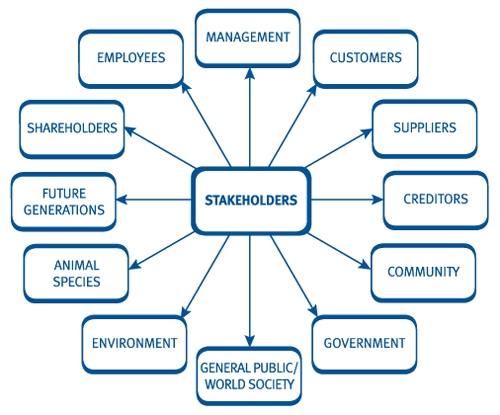Agency theory
Agency theory is part of the bigger topic of corporate governance.
It involves the problem of directors controlling a company whilst shareholders own the company. In the past, a problem was identified whereby the directors might not act in the shareholders (or other stakeholders) best interests. Agency theory considers this problem and what could be done to prevent it.
What is agency theory?
Key concepts of agency theory
A number of key terms and concepts are essential to understanding agency theory.
- An agent is employed by a principal to carry out a task on their behalf.
- Agency refers to the relationship between a principal and their agent.
- Agency costs are incurred by principals in monitoring agency behaviour because of a lack of trust in the good faith of agents.
- By accepting to undertake a task on their behalf, an agent becomes accountable to the principal by whom they are employed. The agent is accountable to that principal.
The separation of ownership and control
Agency theory can be applied to the agency relationship deriving from the separation between ownership and control.

- Companies that are quoted on a stock market such as the London Stock Exchange are often extremely complex and require a substantial investment in equity to fund them, i.e. they often have large numbers of shareholders.
- Shareholders delegate control to professional managers (the board of directors) to run the company on their behalf.
- The Directors (agents) have a fiduciary responsibility to the shareholders (principal) of their organisation (usually described through company law as 'operating in the best interests of the shareholders').
- Shareholders normally play a passive role in the day-to-day management of the company.
- Directors own less than 1% of the shares of most of the UK's 100 largest quoted companies and only four out of ten directors of listed companies own any shares in their business.
- Separation of ownership and control leads to a potential conflict of interests between directors and shareholders.
- The agents' objectives (such as a desire for high salary, large bonus and status for a director) will differ from the principal's objectives (wealth maximisation for shareholders).
Agency theory and corporate governance
Agency theory can help to explain the actions of the various interest groups in the corporate governance debate.
Examination of theories behind corporate governance provides a foundation for understanding the issue in greater depth and a link between an historical perspective and its application in modern governance standards.
- Historically, companies were owned and managed by the same people. For economies to grow it was necessary to find a larger number of investors to provide finance to assist in corporate expansion.
This led to the concept of limited liability and the development of stock markets to buy and sell shares.
- Limited liability: limited risk and so less interest in the firm.
- Stock market: wide and limited individual ownership and the ability to simply sell without the need to take any interest in the firm.
- Delegation of running the firm to the agent or managers.
- Separation of goals between wealth maximisation of shareholders and the personal objectives of managers. This separation is a key assumption of agency theory.
- Possible short-term perspective of managers rather than protecting long-term shareholder wealth.
- Divorce between ownership and control linked with differing objectives creates agency problems.
Examples of principal-agent relationships
Shareholders and directors
The separation of ownership and control in a business leads to a potential conflict of interests between directors and shareholders.
- The conflict of interests between principal (shareholder) and agent (director) gives rise to the 'principal-agent problem' which is the key area of corporate governance focus.
- The principals need to find ways of ensuring that their agents act in their (the principals') interests.
- As a result of several high profile corporate collapses, caused by over-dominant or 'fat cat' directors, there has been a very active debate about the power of boards of directors, and how stakeholders (not just shareholders) can seek to ensure that directors do not abuse their powers.
- Various reports have been published, and legislation has been enacted, in the UK and the US, which seek to improve the control that stakeholders can exercise over the board of directors of the company.
Shareholders and auditors
The other principal-agent relationship dealt with by corporate governance guidelines is that of the company with its auditors.
- The audit is seen as a key component of corporate governance, providing an independent review of the financial position of the organisation.
- Auditors act as agents to principals (shareholders) when performing an audit and this relationship brings similar concerns with regard to trust and confidence as the director-shareholder relationship.
- Like directors, auditors will have their own interests and motives to consider.
- Auditor independence from the board of directors is of great importance to shareholders and is seen as a key factor in helping to deliver audit quality. However, an audit necessitates a close working relationship with the board of directors of a company.
- This close relationship has led (and continues to lead) shareholders to question the perceived and actual independence of auditors so tougher controls and standards have been introduced to protect them.
- Who audits the auditors?
The cost of agency relationships
Agency costs arise largely from principals monitoring activities of agents, and may be viewed in monetary terms, resources consumed or time taken in monitoring. Costs are borne by the principal, but may be indirectly incurred as the agent spends time and resources on certain activities. Examples of costs include:
- incentive schemes and remuneration packages for directors
- costs of management providing annual report data such as committee activity and risk management analysis, and cost of principal reviewing this data
- cost of meetings with financial analysts and principal shareholders
- the cost of accepting higher risks than shareholders would like in the way in which the company operates
- cost of monitoring behaviour, such as by establishing management audit procedures.
Residual loss
This is an additional type of agency cost and relates to directors furnishing themselves with expensive cars and planes etc. These costs are above and beyond the remuneration package for the director, and are a direct loss to shareholders.
Agency problem resolution measures
- Meetings between the directors and key institutional investors.
- Voting rights at the AGM in support of, or against, resolutions.
- Proposing resolutions for vote by shareholders at AGMs.
- Accepting takeovers.
- Divestment of shares is the ultimate threat.
Need for corporate governance
- If the market mechanism and shareholder activities are not enough to monitor the company then some form of regulation is needed.
- There are a number of codes of conduct and recommendations issued by governments and stock exchanges. Although compliance is voluntary (in the sense it is not governed by law), the fear of damage to reputation arising from governance weaknesses and the threat of delisting from stock exchanges renders it difficult not to comply.
Examples of codes of conduct include:
- The UK Corporate Governance Code (2010) for Corporate Governance adopted by the Financial Services Authority (FSA) in the UK.
- OECD code on ethics.
- ACCA codes.
- Specific regulation regarding director remuneration and city code on takeovers.
Stakeholder theory
The basis for stakeholder theory is that companies are so large and their impact on society so pervasive that they should discharge accountability to many more sectors of society than solely their shareholders.

Stakeholder theory may be the necessary outcome of agency theory given that there is a business case in considering the needs of stakeholders through improved customer perception, employee motivation, supplier stability, shareholder conscience investment.
Agency theory is a narrow form of stakeholder theory.
|
Created at 8/15/2012 10:35 AM by System Account
(GMT) Greenwich Mean Time : Dublin, Edinburgh, Lisbon, London
|
Last modified at 11/1/2016 4:19 PM by System Account
(GMT) Greenwich Mean Time : Dublin, Edinburgh, Lisbon, London
|
|
|
|
 |
Rating
:
|
 Ratings & Comments
(Click the stars to rate the page) Ratings & Comments
(Click the stars to rate the page)
|
 |
Tags:
|
|
|
|
|